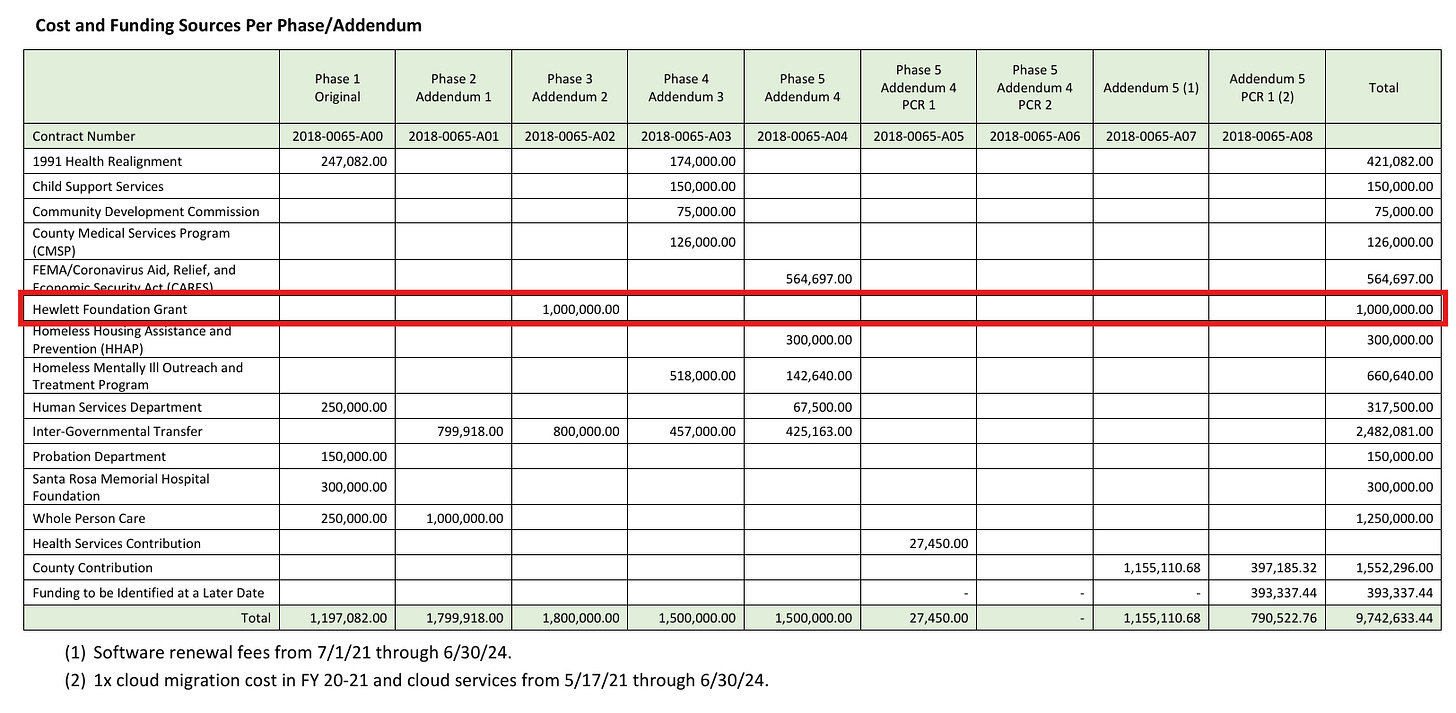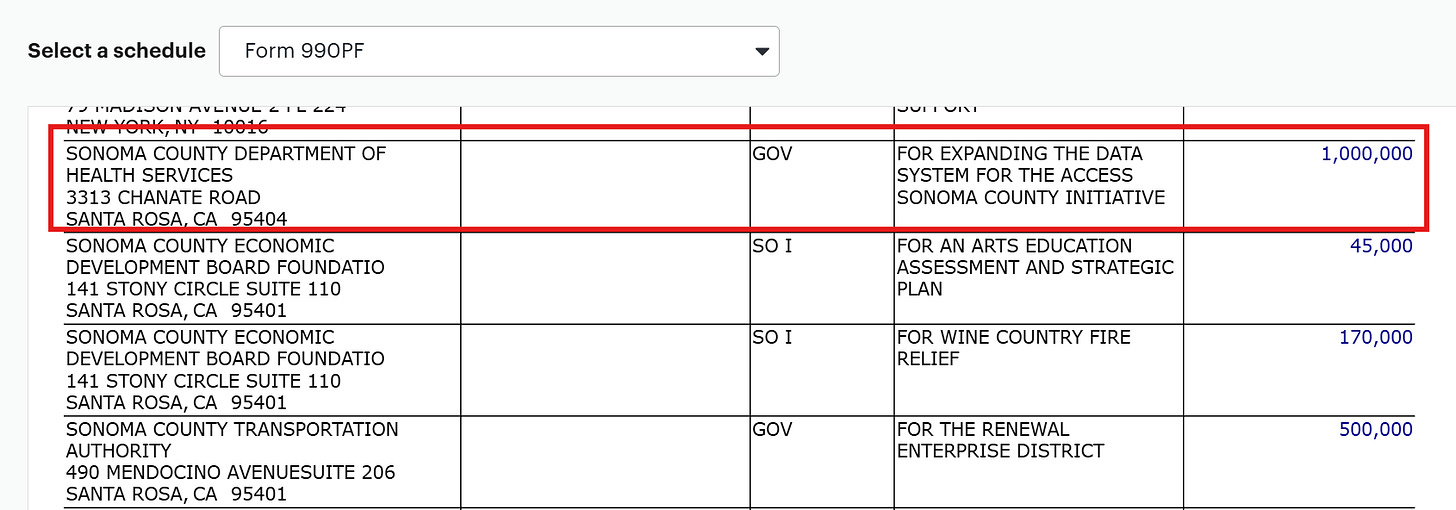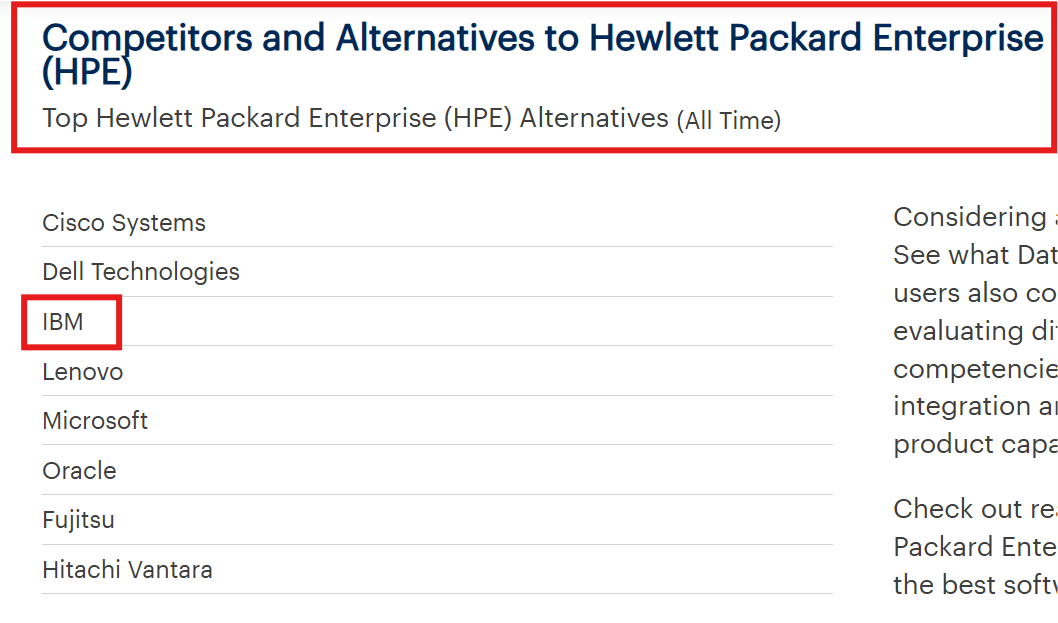Harris County Health Director Barbie Robinson Charged With Felony for Nefarious Contracts With IBM
A warrant has been issued for Robinson's arrest following her duplication of Sonoma County's ACCESS Program agreement with IBM
As of this week, Barbie Robinson, the former executive director of Harris County Public Health, is facing a felony charge in an alleged bid rigging scheme. Court records show Robinson is charged with misuse of official information.
Houston Public Media shared the following:
Barbie Robinson, the former chief of Harris County Public Health, is facing a felony charge and accusations that she misused official information and prematurely disclosed private details of a $16 million contract with the winning company, according to court documents.
Robinson is accused in court documents of sharing private information about the multi-million dollar deal to assist the company with being selected for the award. The charge comes just months after she was fired from her position during the process of a separate investigation.
The $16 million contract was awarded to IBM for services enabling technology for ACCESS Harris County, a public health program championed by Robinson that’s aimed at serving vulnerable communities.
Robinson allegedly shared information about the contract with IBM officials almost a year before county commissioners awarded it to the company, according to emails obtained during an investigation.
She developed a similar public health program while working as an administrator for Sonoma County in California. Jonathon Christian, a Texas Ranger who investigated the communications asserted Robinson “had a pre-existing relationship with IBM for ACCESS Sonoma and wanted to replicate the ACCESS program in Harris County.”
According to emails obtained during the investigation, Robinson shared details in exchanges about drafting the company’s proposal for the bidding process. Emails include discussions about job descriptions and instructions for the proposal.
“This should give you a good starting place to create a job description for Harris County,” an IBM staffer said in one email.
IBM was awarded the contract in 2022. The company later received another $16 million contract renewal.
“While it appears that Robinson is using her private e-mail to conduct official county business outside the reach of public transparency requirements, Affiant believes that this e-mail shows that IBM is helping to craft part of the ACCESS program for which it is then making a competitive bid for later in the same month,” Christian wrote.
Court documents reference an investigation and other e-mails published by the Houston Chronicle about the department’s contract with Disaster Emergency Medical Assistance Consulting and Management, a vendor for Sonoma County Department of Health Services under Robinson.
District Attorney Kim Ogg is set to discuss Robinson’s charge during a press conference Tuesday.
In a post on X, Harris County Judge Lina Hidalgo pointed blame at Ogg, who in 2022 indicted three of her staffers in what investigators said was an attempt to steer an $11 million COVID-19 vaccine outreach contract to a preferred vendor.
“Kim Ogg’s attack on Barbie Robinson is the same thing my former staff members were falsely accused of by her,” Hidalgo said. “Nothing to show for it three years later, because as we’ve said, they did absolutely nothing wrong and her accusations are rife with falsehoods.”
“She's been voted out, but Kim Ogg continues her pattern of weaponizing her office against those who disagree with her, like Director Robinson, who led a successful program DA Ogg did not like,” Hidalgo said.
A warrant was issued for Robinson’s arrest.
The ACCESS Sonoma Data Hub Project highlighted several addendums within the funding summary presented to the Sonoma County Board of Supervisors for approval on May 25, 2021.
The Executive Summary stated:
On March 23, 2018, Sonoma County entered into an agreement with International Business Machines Corporation (IBM) to provide software and implementation of the Accessing Coordinated Care and Empowering Self Sufficiency (ACCESS) Sonoma Data Hub Project (ACCESS Sonoma) to support the County’s rapid response safety net services efforts. Sonoma County Safety Net Departments participating in the project include Health Services, Human Services, Community Development Commission, Probation, Child Support Services, District Attorney, Sheriff, and Public Defender. The ACCESS Sonoma Data Hub Project achieves the following: 1) provides a global view of clients that accounts for their multiple needs, allowing for coordinated front-end referrals and service delivery across the Safety Net Departments; and 2) allows for continued analysis of each client’s needs, collaborative case management, and evaluation of outcomes to support more proactive and prevention-focused efforts aimed at addressing critical client needs.
The Safety Net Departments have completed Phases 1 through 5 of the multiphase initiative to support ACCESS Sonoma. This item requests approval to execute Addendum 5 to the agreement with IBM and allows for Project Change Request 1 within Addendum 5. These agreements will facilitate data migration and cloud hosting of the ACCESS Sonoma data hub and dashboards to enable the County to leverage features developed in the ACCESS platform, some of which were developed and funded by other counties. This effort will create full cloud access for all participating Safety Net Departments to ensure availability and resiliency during disasters.
IBM featured an extensive Case Study of Access Sonoma County on their website. The program supposedly helped to reduce homelessness and received national recognition for its groundbreaking efforts. During 2019 and 2020, the initiative won the Financial Times Intelligent Business Award and the National Association of Counties Achievement Award.
Phase 3, Addendum 2, highlighted a $1M grant from the Hewlett Foundation. In addition to identified funding streams, such as Whole Person Care and Intergovernmental Transfer funding, the Safety Net Departments were invited to apply for funding from the California Health Care Foundation and The William and Flora Hewlett Foundation to support the project. On October 26, 2018 the County was notified of a $1.0 million award by the Hewlett Foundation to support the project.
The County’s December 13, 2018 press release stated the following:
The Sonoma County safety net departments accepted a $1 million grant to continue advancing the work of the Accessing Coordinated Care and Empowering Self-Sufficiency (ACCESS) Sonoma County initiative from the Hewlett Foundation this week.
The basis of ACCESS relies on close coordination between the safety net departments—Health Services, Human Services, Community Development Commission, Probation, and Child Support Services and criminal justice partners—to holistically support clients with complex needs, and ultimately improve their health and economic stability.
ACCESS, which has the goal of identifying the most vulnerable residents in the community—those experiencing ongoing unemployment, homelessness and housing insecurity, behavioral health and substance use issues, and who also may receive services that intersect with agencies in the criminal justice system—and helps them receive the support they need.
“In April of 2017, the Board of Supervisors directed the departments with shared clients to strengthen the County’s safety net services to help our highest need residents achieve recovery and self-sufficiency,” said Sonoma County Third District Supervisor Shirlee Zane.
Karen Fies, Director of the Sonoma County Human Services Department said she was grateful the Board continued making the ACCESS initiative a priority by including it the County recovery plan finalized in September in response to last year’s wildfires.
“We appreciate the support of the Board of Supervisors on this project. It is important that County departments responsible for the health and well-being of our community have the tools and technology to work together for the betterment of residents,” said Fies.
The safety net departments began addressing the problem by concurrently assembling a flexible, interdepartmental multidisciplinary team and developing a comprehensive data-sharing support system for enhanced care coordination.
“Given Sonoma County’s housing crisis, it is imperative we link our safety net services as a means to provide coordinated assistance to individuals experiencing poverty and housing instability,” said Margaret Van Vliet, Executive Director of the Sonoma County Community Development Commission.
ACCESS Sonoma County is currently working with IBM to integrate its safety net systems via a hub that enables case workers, clinicians, housing staff, probation officers and others across various departments to view all services a client is receiving. This holistic view facilitates better data sharing leading to enhanced coordinated care and outcomes.
The mobile aspect of this system will allow the County and community workers to work with clients out in the field, and more importantly, it will allow the client the ability to actively participate in their care plan using technology to enable place-based participation.
The funds from the Hewlett Foundation grant will be used to continue the ongoing work ACCESS Sonoma County has been doing with IBM, specifically to build-out its integrated hub by adding systems from other agencies and eventually community partners who are critical to holistic care.
The anticipated benefits of ACCESS Sonoma County is improved health and well-being for residents. The implications of these initial successes demonstrate more equitable, effective and efficient approaches to understand and address critical needs of residents.
“This programming allows safety net departments to share information on mutual clients, increasing the likelihood of coordinating services for residents who need it most and improving outcomes for these people,” said David Koch, Chief Probation Officer of the Sonoma County Probation Department.
Recent national and state trends have shown the need for services to focus on the coordination and integration of service delivery across safety net agencies. A significant factor driving both cost and inefficiency is the siloed and fragmented way in which many safety net agencies currently deliver services.
“A coordinated approach focusing holistically on all of the needs of an individual could yield better outcomes for those being served,” said DHS Director Barbie Robinson whose department leads ACCESS. “Coordinating so many different services is challenging; however, we are working together toward solutions that both strengthens safety net systems and reduces costs.”
The William and Flora Hewlett Foundation, commonly known as the Hewlett Foundation, is a private foundation, established by Hewlett-Packard cofounder William Redington Hewlett and his wife Flora Lamson Hewlett in 1966
According to the Form 990 for the 2018 fiscal year, Mr. Larry Kramer was the Hewlett Foundation’s Board President at the time the grant was disbursed to the County of Sonoma to initiate the ACCESS Program.
He received an annual salary of $861,725 with $87,954 in benefits. For a ‘nonprofit’ Mr. Kramer seems to be profiting quite well.
Mr. Kramer is the same gentleman who bailed out Mr. Sam Bankman-Fried following the FTX scandal, so his leadership is concerning.
Being that Hewlett Packard Enterprise and International Business Machines Corporation (IBM) are well known competitors, it’s odd that the Hewlett Foundation donated $1M towards funding contracts with IBM.
The County described the ACCESS Program’s inception as follows:
The roots of this technology emerged during a design-thinking session between IBM, County frontline staff of eligibility workers, adult protective services staff, clinicians, social workers, probation officers, child support and housing specialists care coordinators from each of the Safety Net Departments and continues to evolve based on IMDT needs and user feedback. The technology developed for ACCESS Sonoma County houses client information from various Safety Net Departments into one integrated data hub. The system uses a Cloud based client care plan which allows the IMDT to access the care plan wherever they happen to be engaging with the participant. The power of the golden client record combined with the ability to access the care plan at any time and from anywhere makes this an extremely innovative approach to offering true wrap-around services.
The terms of the Platform states:
The Platform contains confidential and proprietary information, materials, data, databases, contents, processes, methodologies, know-how, software, text, displays, images, video, audio, trademarks, logos, service marks, features and functionality, and the design, selection and arrangement thereof, are owned by Sonoma County, its licensors or other providers of such material and are protected by United States and international copyright, trademark, patent, trade dress, trade secret and other intellectual property or proprietary rights laws (collectively, the "Content").
These Terms of Use permit you to use the Platform for your personal, non-commercial use only. You must not reproduce, distribute, modify, create derivative works of, publicly display, publicly perform, republish, download, store or transmit any of the material on our Platform, including but not limited to Content, except: (a) your computer may temporarily store copies of such materials in RAM incidental to your accessing and viewing those materials; (b) you may store files that are automatically cached by your Web browser for display enhancement purposes; and (c) you may print or download one copy of a reasonable number of pages of the Platform for your own personal, non-commercial use and not for further reproduction, publication or distribution. You must not: (a) modify copies of any materials from the Platform or received through the Services; (b) use any illustrations, photographs, video or audio sequences or any graphics separately from the accompanying text; or (c) delete or alter any copyright, trademark or other proprietary rights notices from copies of materials from the Platform.
Companies that collect large amounts of data on their users stand to profit from this service. Selling data to brokers is an important revenue stream for big tech companies. Advertisers and businesses benefit from increased info on their consumers, creating a high demand for consumer info.
Being that Ms. Robinson leaked private contract details, is it possible that client data stored in the cloud was also sold to interested parties?
“Those who trust in their riches will fall, but the righteous will thrive like a green leaf.”
-Proverbs 11:28













She was cold busted thanks to the effort of Adina.
She conducted improper PIT census repeatedly